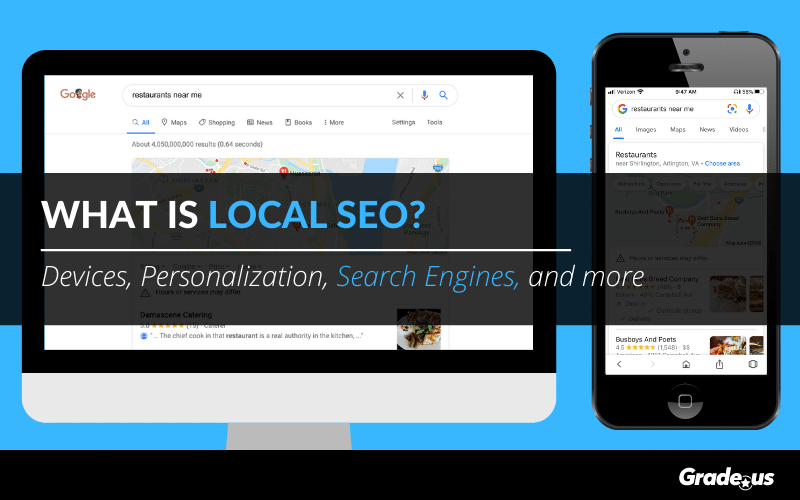If your business sells services or products locally, the success of your business hinges on how visible you are on search engines. Google has become pretty smart.
Did you know that when you use ‘local’ words like ‘restaurant near me’ in your Google search, you get served an entirely specialized set of results that are tailored to your local search?
Whether you’re searching on a desktop or a mobile device, using voice search, or you’re in your car, local search engine optimization or Local SEO impacts how your customers can find you.
Pretty much everyone searches locally in 2020.
Research shows that 60 percent of local searches are performed on mobile devices. That number is also expected to grow as local search continues to grow.
If you’re not familiar with the term Local SEO, that might only be because the ‘branding’ of the term is not ubiquitous, despite the fact that every local business participates in some capacity. When I suggested on Twitter that Local SEO was a small niche within SEO, Miriam Ellis of Moz shared her perspective:
I've come to see this a bit differently over the years @GarrettSussman. Local SEO is a street-level marketing environment, being contributed to by millions of business owners and their staff, sometimes assisted by agencies and experts. It's quite huge.
— Miriam Ellis (@Miriam_Ellis_) September 2, 2020
Andrew Shotland of LocalSEOGuide agreed that the number people who actually practice Local SEO is quite massive:
I'd argue it's not a niche industry (assuming you mean "non-mainstream" in the SEO biz). It's just significantly more fragmented than non-Local SEO, which is already pretty fragmented. I wouldn't be surprised if there are 100x more SEOs doing Local SEO than any other type.
— Andrew Shotland (@localseoguide) September 2, 2020
Since review management typically compliments Local SEO so tightly, it felt appropriate to dig a bit deeper into how we define Local SEO, how we can think about Local SEO holistically, and improve our Local SEO.
Table of Contents
Get the Reputation You Deserve with Grade.us
What is Local SEO?
To better understand how we define Local SEO, I turned back to #SEOTwitter. There were a ton of great answers from the community and they all had different nuances to their definitions.
Strictly about location and search engines
Some SEOs focused on keeping the definition simple and direct. They defined Local SEO focusing on the local and the SEO. Geography and search engines. There was also a subtext around the intent of the searches.
The optimization of a business with the intent of being visible for organic searches in a specific geographic location.
— Amanda Jordan (@amandatjordan) September 10, 2020
Simply, optimizing a website for queries with local intent.
— Samuel Olatunde (@SamOlatunde404) September 10, 2020
The process of increasing your online visibility in local search results 🙂
— Abby Reimer (@abbyreimermpls) September 10, 2020
Local SEO is the process of optimising a business to organically appear for localised searches.
— Itamar Blauer (@ItamarBlauer) September 10, 2020
A subset of SEO that focuses on user queries where proximity influences relevancy.
— Victor Pan 🇹🇼🇺🇲 (@victorpan) September 10, 2020
SEO for queries with local intent.
— Emily Brady (@Plotboilers) September 10, 2020
Local SEO is an ongoing effort to identify a business's strengths and engineer ways for a searcher in the right place to notice those strengths at the right time.
— Phil Rozek (@philrozek) September 10, 2020
Local SEO is the practice of making your local listings rank for specific targeted keywords.
— Clarissa Filius (@clarissafilius) September 11, 2020
SEO where location is a relevant context.
— Gyi Tsakalakis (@gyitsakalakis) September 10, 2020
Helping people and connecting with local communities
This second group of definition found it essential to include a business to customer connection within the definition. They specifically addressed the customer within the context of the Local SEO definition.
Local SEO is a customer service component which ensures nearby online searchers can find, like, connect with and choose your local business.
— Miriam Ellis (@Miriam_Ellis_) September 10, 2020
Putting a local business in front of the right local customers
— Tim Capper (@GuideTwit) September 10, 2020
Helping local people (and Google) understand what you're an authority on and why you're an authority on it.
— Brendan Hufford (@BrendanHufford) September 10, 2020
Local SEO is getting your business in front of the right customers at the right time. In this day and age it’s also delivering relevant information to allow customers to make safe choices. I.e offering curb side pick up or other delivery options.
— newmediaMike (Mike Allan) (@SEOVideoCoach) September 10, 2020
Connecting businesses/services to their local prospects through search.
— Aaron Weiche (@AaronWeiche) September 11, 2020
Local SEO is being the go-to resource in your area for that query. I personally hope that one day search gets so good at this, that it will return relevant posts from your neighborhood bloggers vs just news outlets or giant Mommy blogs with big budgets nowhere near you.
— Rachel Di (@geekunicornweb) September 10, 2020
Getting businesses that exist within a specific geographical area in front of potential customers searching for the products/services the business provides in order to grow revenue and improve their reputation in the community.
— Justin Mosebach (@jlmosebach) September 10, 2020
Specifically including Google My Business or Google Maps
Another group of experts found it essential to explicitly acknowledge that the definition of Local SEO also needs to include either Google My Business features or Google Maps. I found these definitions interesting because there’s an implication of Google being the primary focus of Local SEO (though Bing, Yahoo, Apple Maps, and local service directories/review sites also serve as search engines).
Local SEO = optimizing a business for optimal local search visibility, in both maps results and organic search through on-site optimizations (including content), GMB and other local signals such as reviews and links.
— Niki Mosier (@nikers85) September 10, 2020
Getting higher on google maps, and higher on google for the terms you want to show up for in your area.
— Tim Brown (@timbrownmpls) September 11, 2020
Local SEO is leveraging all of the unique SERP features and aspects of search impacted by geographic location to generate additional foot traffic, calls, site visits, appointments, bookings or purchases for your target business.
— Jeremy Rivera (@JeremyRiveraSEO) September 10, 2020
Local search is being listed in Google Maps, and ranking for localized organic search results, and geo-related queries.
— Bill Slawski ⚓ (@bill_slawski) September 10, 2020
Local SEO is the process of optimizing content & core profiles within Maps & SERPs based on geo-location; while helping businesses owners identify new opportunities for brand awareness, reviews & partnerships - all with the intent to increase foot traffic, calls, and conversions.
— Jen Currier (@jen_currier) September 10, 2020
Getting found in Google's localized map listings.
— Nick LeRoy (@NickLeRoy) September 10, 2020
Specifically excluding Google My Business
I wanted to highlight Dan’s response, because he found it important to express that Google My Business SEO and Small Business SEO should not be explicitly a part of the definition.
Any SEO that deals with localization.
— Dan Leibson (@DanLeibson) September 10, 2020
What it is not:
SMB SEO
GMB SEO
Though the narrative has focused way to much on that for way to long.
GMB/local listings is for sure at best table stakes, and at worst a distraction/opportunity cost. None of the top local SEOs I know are focusing on that stuff at all. All organic search all the time. And then building systems for things like syndicating content via Google Posts.
— Dan Leibson (@DanLeibson) September 10, 2020
Pointing out that most average people don't understand Local SEO
I imagine that Fiona’s point hits home for many Local SEOs working with a client and was worth including. If you’re starting a Local SEO agency, explaining rankings and personalization is a major challenge.
Local SEO is explaining to clients that their brick & mortar stores in California likely won't rank for searches in Arizona no matter how many times you use the state in your meta.
— Fiona Riedel (@fionamichelle17) September 10, 2020
Comically accurate yet not definitive
Presented without comment.
If you are an e-commerce company without physical locations, it's your worst nightmare
— Andrew Shotland (@localseoguide) September 10, 2020
Moz defines local SEO as the practice of…
“increasing search visibility for businesses that serve their communities face-to-face. These can be brick-and-mortar businesses with physical locations, like a grocery store or dentist’s office, or service-area businesses that operate throughout a certain geographic area, like an electrician or house cleaning company. This includes everything from claiming a business listing to ensuring a franchise location appears in a local search on Google (a process known as location data or citation management). It also extends to managing online ratings and reviews, local-centric social media engagement, and beyond.”
While this definition by Moz is not limited to one sentence, it attempts to include all of the factors that were mentioned by the Local SEO Twitter community. It’s interesting that Moz goes as far to include social media.
So how can we think of Local SEO:
Local search that enables searchers to run a geographically constrained search against a database of local listings. Local SEO is a subset of search engine optimization; it enables local businesses to optimize their business for searches with local intent.
Searches with local intent?
First, we’ll start with the three basic types of searches. Search queries can be broken down into three broad categories.
- Informational: Broad, open-ended search queries that are focused on a specific topic or idea, e.g., "restaurants," "electrician Chicago." Searchers with informational queries are typically at the start of their search.
- Navigational: These searches are focused on finding a specific business or website. Examples of local navigational searches could be "pizza hut 76051" or "Subway restaurant Dallas."
- Transactional: These are precise, laser-focused search queries that convey conversion intent. From a local standpoint, these could be specific searches like "Noodles and Company coupon codes" or "Smile Dentistry directions."
These informational, navigational, and transactional searches approach local search queries at a macro level. Let’s take a look at search queries from a meso point of view.
To do that, we’ll approach this from Google’s point of view. Google focuses on key moments in the buyer’s journey.
They call them micro-moments.
Google defines a micro-moment as “an intent rich moment when a person turns to a device to act on a need —to know, go, do, or buy.” Research from Think with Google outlines the four key moments in a (local) searcher’s journey that matters most.
- 1. I-want-to-know moments: Searchers are in research or exploration mode. At this stage, searchers rely on broad, informational search queries (e.g., restaurant, hotel, plumber near me); these search queries are basically informational. They're not looking for something specific because they don't know enough about what they want.
- 2. I-want-to-go moments: These searchers can be conducting a general or specific search for a local business. People at this stage are more focused on transactional search queries. Again, these can be either general or specific keywords that include specific destinations (i.e., "funzone go karting") or general keywords (i.e., go karting near me) with local modifiers. These people are near the end of the buyer's journey; they're preparing to make a decision.
- 3. I-want-to-do moments: These queries are similar to the I-want-to-go moment above in the sense that they can be both specific or general. The difference here is the fact that searchers are attempting to complete a task or try something new (i.e., "skydive Chicago"). Like the I-want-to-go searchers, these people are near the end of the buyer's journey. They're using transactional keywords, and they have a pretty good idea of the type of activity they're looking for.
- 4. I-want-to-buy moments: At this point, searchers are ready to convert; they may need help deciding what to buy or how to buy it. Their research has concluded, and they're searching for a specific answer or solution to their query (i.e., "Naperville Target store address"). They know what they want. They're using navigational keywords as they move rapidly towards a conversion.
See the overlap between keyword types and micro-moments? It’s important to identify these differences and the impact they have on your research and campaign. What about desktop vs. mobile search?
The differences between desktop vs. mobile search
Remember earlier, when I mentioned that an average of 60 percent of local searches were performed on mobile devices? Google pays close attention to the devices that searchers use to formulate their queries.
Why would they do that?
They do this because 1/3 of all mobile searches on Google are local. It’s no different on Bing; Microsoft says 53 percent of all mobile searches on their search engine have local intent. Does this impact how search engines treat local search queries?
It makes a huge difference.
SEMrush looked at 50,000 random keywords. They wanted to see if search results for the same query were different on different platforms. The results of their study were surprising (in a challenging) way.
Only 13 percent of websites kept the same position across devices.
It gets worse; 31 percent of desktop search results were not visible on mobile SERPs. Only 10 percent of URLs keep the same position on both desktop and mobile.
What’s going on here?
Search engines prioritize search results based on a wide variety of factors — screen space, SERP features, and the higher prevalence of local search intent/queries are a few obvious examples. Let’s take a look at some of these differences to see this prioritization in action.
I used the query “plumbers 22206.“
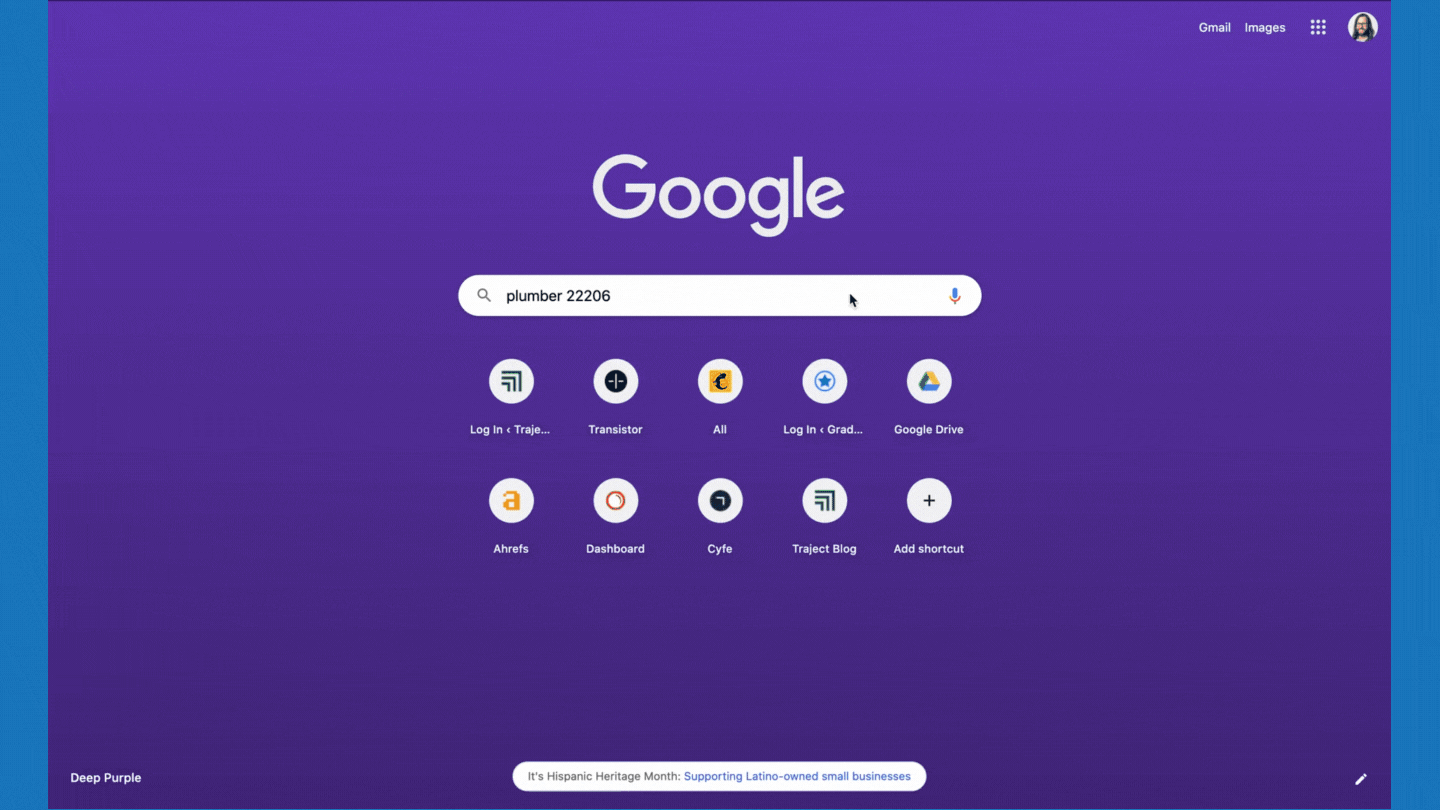
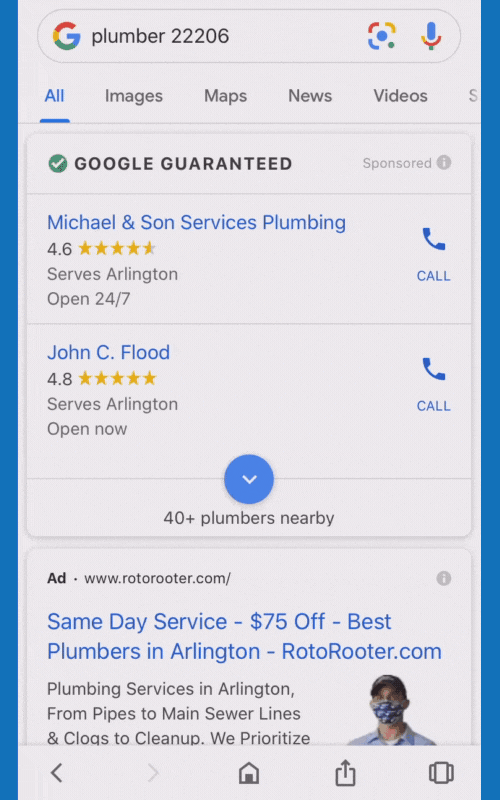
In previous years, the differences were fairly significant. That’s not always the case today. While some of these differences remain, Google has harmonized a considerable amount of searches.
First, the differences.
- Autocomplete provides searchers with options as they're typing, but before search results are displayed.
- Android users are always logged in, so they always receive personalized results. This isn't always the case with desktop search.
- Website favicons are displayed prominently in mobile search results. They're not displayed on the desktop.
- SERP filters vary based on the keyword, location, or results, though they were the same in our example.
- On mobile, the local packs occasionally display four results, while desktop-only displays three.
- The "people also search for" box was displayed on mobile more often.
- A large number of queries do not display ads on desktop (see screenshots below).
Next, the similarities.
- Google Local Service Ads are displayed for both mobile and desktop search results.
- Google Ads are sometimes displayed below Local Service Ads.
- Google Ads are displayed on both the top and bottom of search results on both desktop and mobile.
- The search results are largely the same for a variety of keywords, showing similar ads, search results, filters, local packs, knowledge panels, review sites, and more.
- The "related searches" keywords were displayed on both mobile and desktop search results.
This seems inconsistent.
The search results seem to be the same for the most part. Only they’re not. A few of the brands listed in mobile search results aren’t visible on desktop. It’s subtle, but this seems to validate the results from SEMrush’s study.
Note: Google is always testing new layouts and experimenting with new SERP features. In fact, not only do search results fluctuate, these subtle nuances change day to day.
One other important thing to keep in mind is that unless you’re searching in ‘incognito mode’ personalization will impact your search results as well. You might have a different set of results compared to someone sitting right next to you on a different device.
The anatomy of a local search on Google
Google’s local search results have several elements depending on the keyword or query. It typically includes the following details:
- Google Ads
- Google Local Service Ads (if applicable)
- The local pack
- The local shopping carousel
- Organic listings including aggregate reviews
These are the core elements for Google search results. Local search results also include:
- Related searches
- "People also search for" suggestions
- The knowledge panel
- Rich snippets (i.e., aggregate star ratings)
Here are a few screen captures showing the various permutations of local search results pages.
Screen capture: Electrician near me
These screen captures display Google Ads, Google Local service ads (for select queries), organic search results, the related searches, the “people also ask” box, and rich snippets.
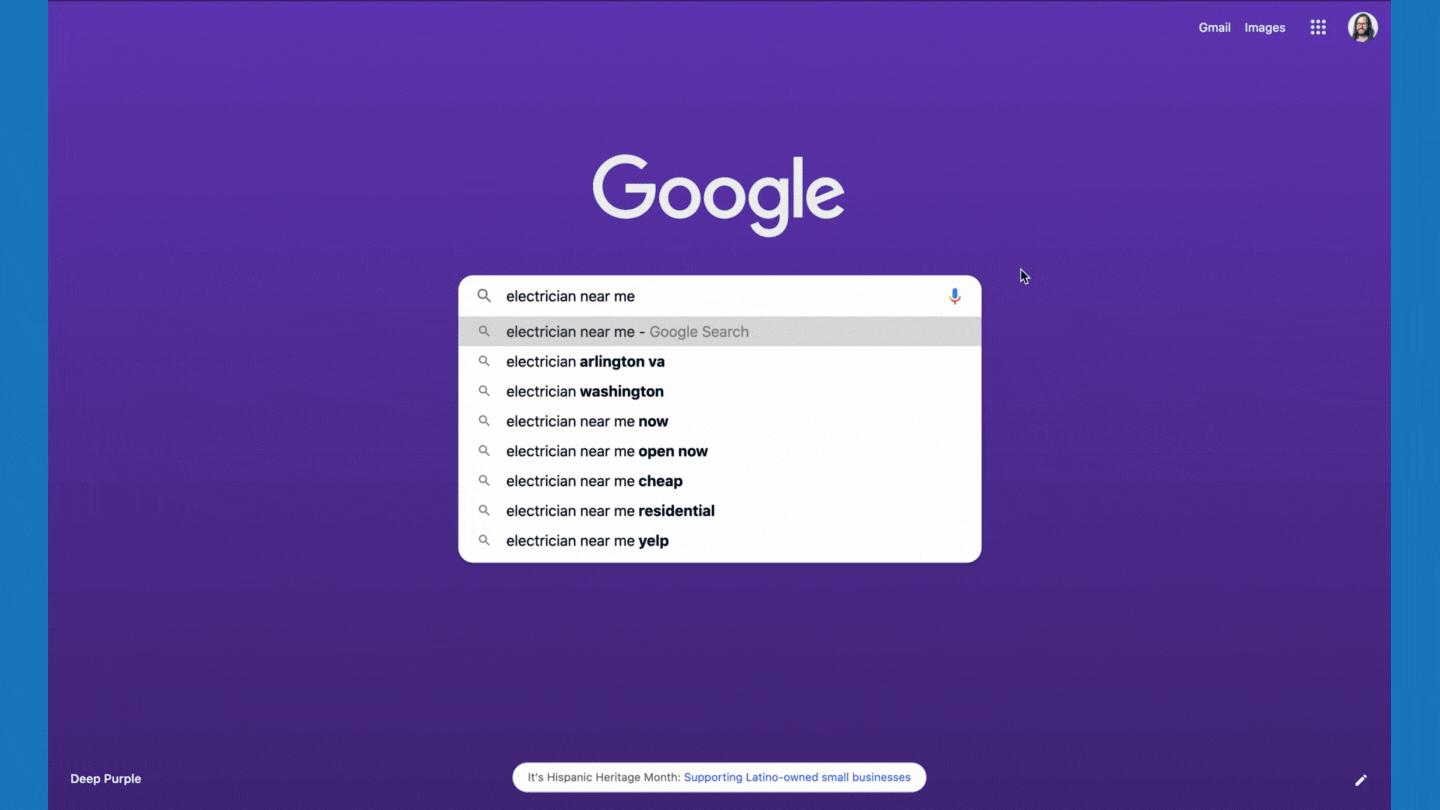
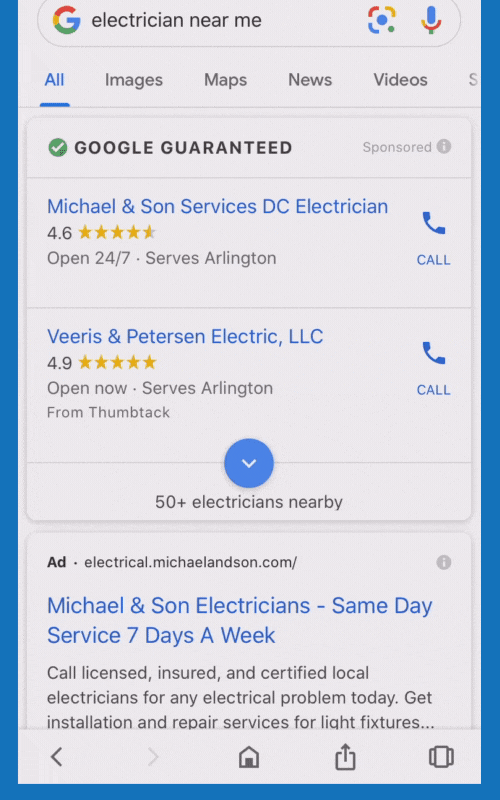
Screen capture: Restaurants near me
These screen captures display the local pack, search by photos (via Google My Business), Browse by filters, the related searches, the “people also ask” box, and organic search results.
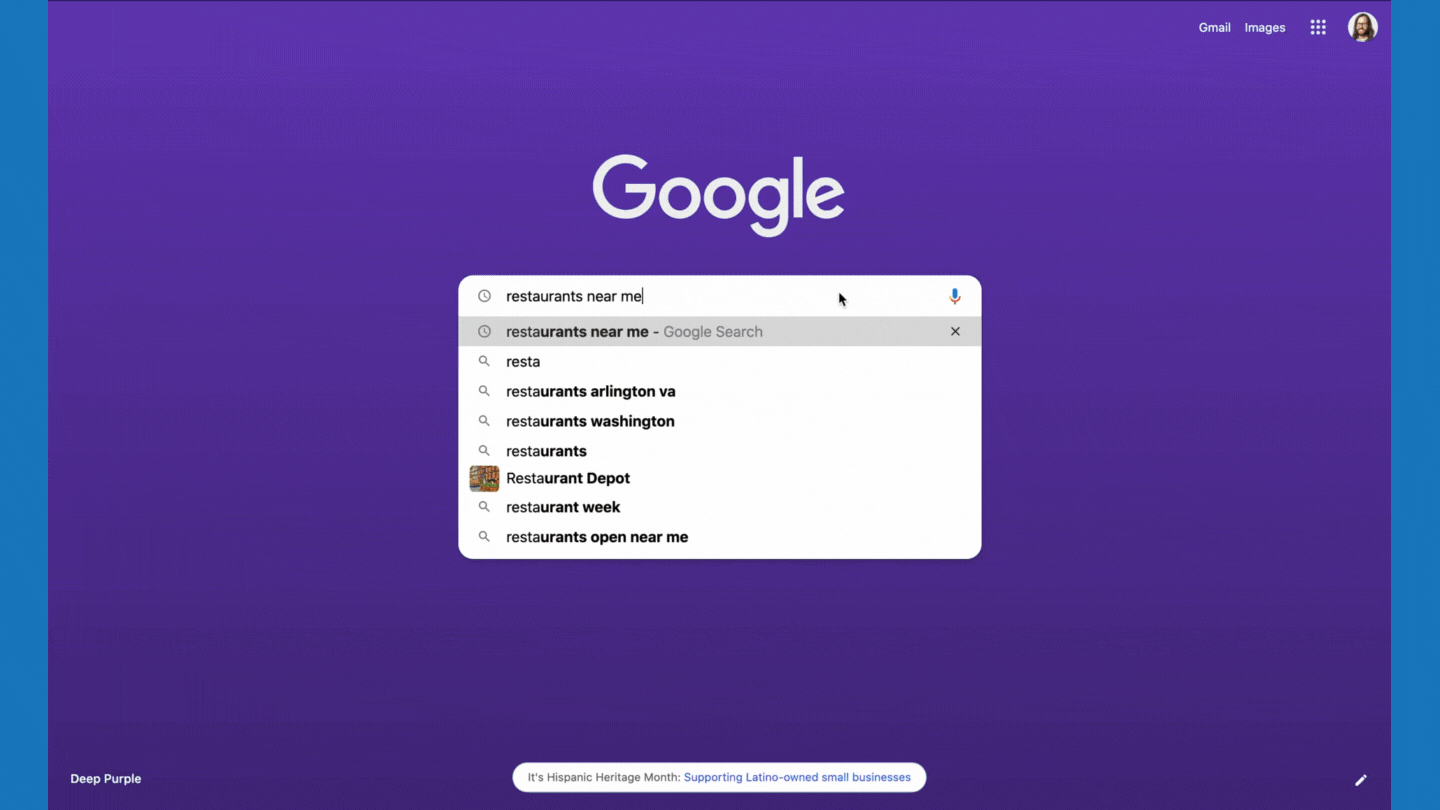
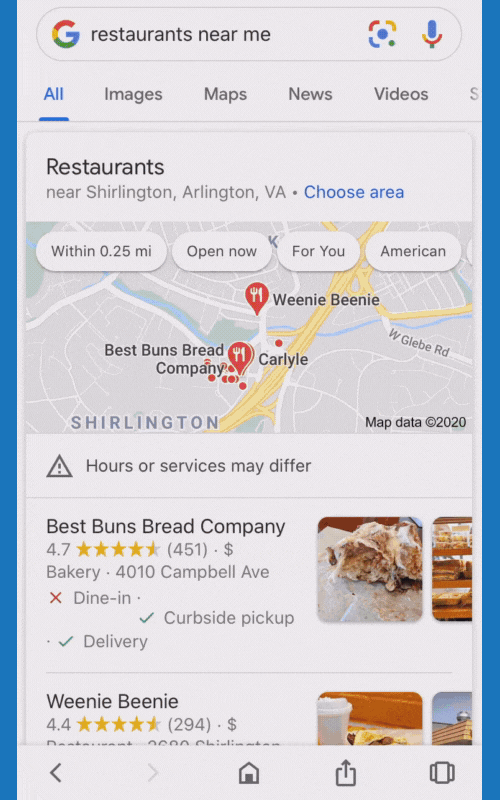
Screen capture: TV near me
These screen captures displays the local carousel ads, Google ads, the local pack, Google ads, organic search results, related searches, and the people also ask box.
Recently, Google has focused a little more on features around local eCommerce. Notice the curbside pick up tags on the images carousels. Keep your eyes peeled for more locally focused eCommerce features.
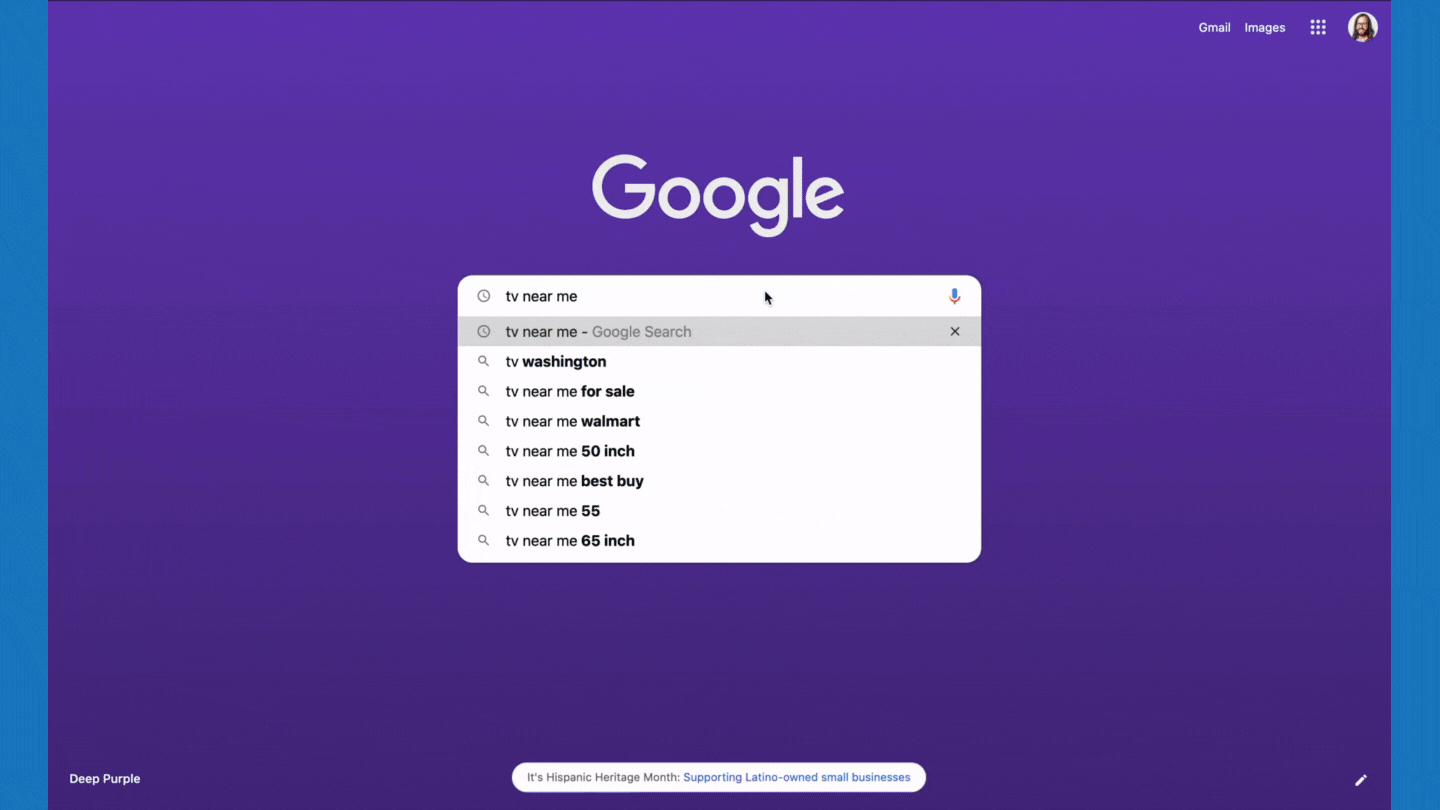
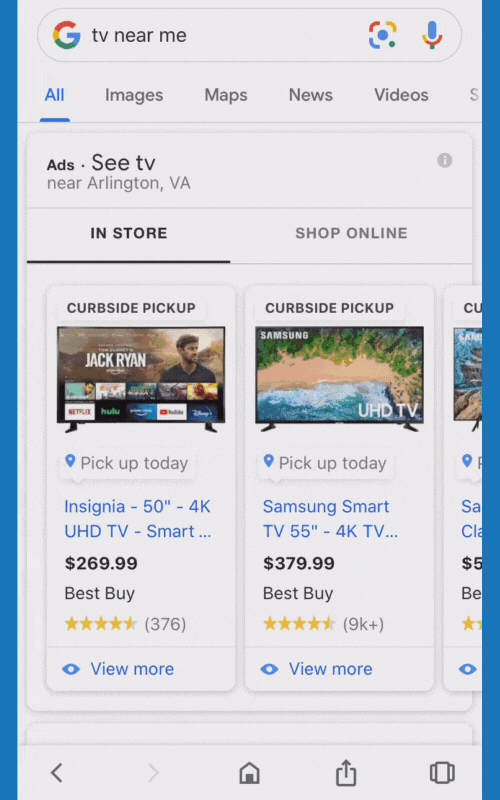
Google tailors search results to local specific queries; these local queries can include:
- City, state, or zip codes
- Near me
- Location modifiers (e.g., Los Angeles, Main Street)
- Branded queries (i.e., Buffalo Wild Wings)
- Business type (e.g., Photographer, wedding planner, ad agency)
- Occasions (e.g., Weddings, Christmas, birthday party)
- Quality modifiers (e.g., best, top, affordable)
They adjust search results based on searcher queries; this means you can use these queries/modifiers to build out your list of keywords.
Local search on other search engines
While local search is available on other search engines, it isn’t as robust or fully featured as Google’s search offerings. You’re probably not surprised, am I right?
Here’s a brief look at local search on other search engines.
Bing
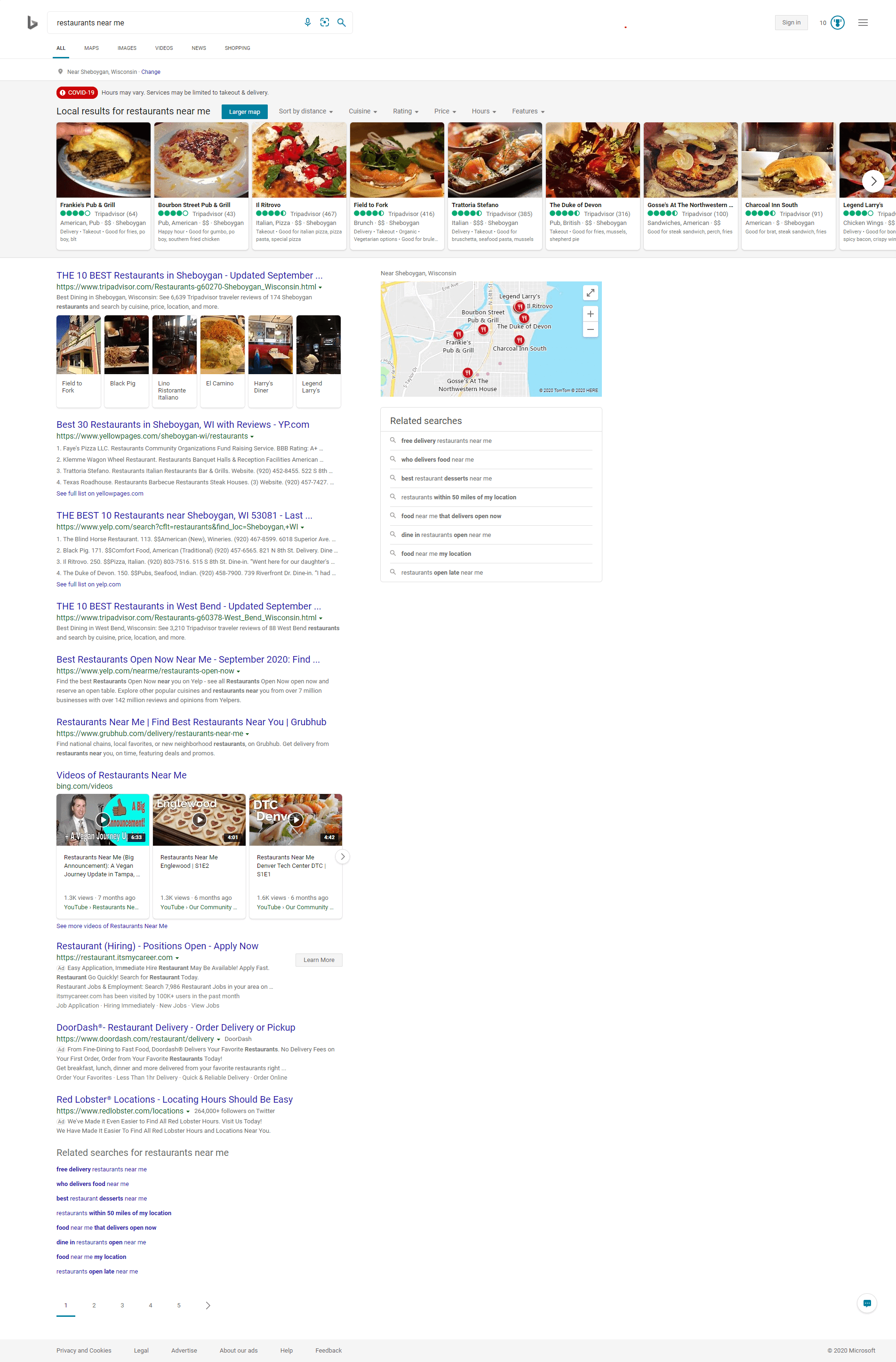
Bing includes many of the same elements we’ve discussed above. For searches like “restaurants near me,” they include:
- The TripAdvisor carousel
- Rich snippets and images
- Videos of local restaurants
- Organic search results
- A map of local restaurants
- Related searches
Yahoo

Yahoo relies on Yelp to build out its local search results, which are pretty bare bones. For the query “restaurants near me,” they include:
- The Yelp local pack
- Organic listings
- Videos of local restaurants
- Related searches
DuckDuckGo

DuckDuckGo keeps things simple. For the search query “restaurants near me,” they include:
- The TripAdvisor local pack
- Favicons for each search result
- Videos of local restaurants
- Organic listings
While these search engines aren’t Google, they still provide value; searchers use these search engines to find the products and services they need locally.
Local SEO and voice search
What about voice search?
According to Statista, voice search assistants are expected to climb to 8 billion by 2023. Voice search is easier for people to use. It’s faster, more convenient, and a perfect fit for mobile.
When it comes to local SEO, voice assistants, Google Assistant, Siri, and Alexa, are relevant and important. They’re a channel more searchers are turning to and they’re supported by multiple search engines — Google, Apple, Amazon, and others.
- Google devices recommend search results based on their local pack.
- Siri relies on Yelp though they may be building their own index.
- Alexa takes information from Bing search, then uses both Yelp and Yext data to create a response.
You’ll want to optimize for All three voice assistants, focusing on ranking factors like page speed, top three ranking, and earning a featured snippet position. As I mentioned previously, focus on building your Google My Business profile. You’ll want to verify that your citation data is accurate.
Another important, but obvious point?
Make sure your content is easy to understand and simple to read.
Local SEO via third-party industry and review sites
Industry-specific review sites have a strong presence in Google’s local search results via rich snippets and listings in their organic results. Specialty review sites like Healthgrades, Avvo, Zillow, and others also function as third-tier search engines.
Searchers use these specialty sites to ferret out in-depth information that’s not immediately available in Google’s search results. What’s also helpful is the fact that these specialty sites rank high in Google’s local search. We’ve published several comprehensive guides you can use to improve your Google reviews and your distributed review portfolio and local search rankings; take a look.
- Top 23 Review Sites To Get Customer Reviews
- How To Boost Patient Referrals with Healthgrades Reviews
- HomeAdvisor Reviews: How To Double Your Lead Flow In 45 Days
- Use Zillow Reviews To Build a Profitable Real Estate Business in 60 Days
- Using Houzz Reviews To Build Your Home Services Business
- How To Get Edmunds Reviews and Increase Car Dealership Leads
- How To Get BBB Reviews For Your Business
- The Knot Reviews: How to Grow Your Wedding Vendor Reputation
- How To Drive More Restaurant Orders and Calls with Zomato Reviews
- Caring.com Reviews: How To Attract More Seniors with 5-Star Reviews
- How To Build a Great Healthcare Practice with Zocdoc Reviews
- Avvo reviews: How attorneys can win 4.5x more clients
How to improve your visibility in local search
In her recent post, Miriam Ellis shares a really simple strategy for boosting your rank in local search results.
“Google’s house may be structurally unsound, but it’s also huge, with a 90% search engine market share globally and over 2 trillion searches per year, 46% of which are for something local. Right now, running the most successful local business possible means acquiring the largest share you can of those estimated 1 trillion annual local searches.”
Her advice?
You feed Google a steady stream of content about your business. This isn’t rocket science, and it’s not particularly difficult.
- Send the right citation signals by adding citation data, e.g., the name of your business, your address, and telephone number. Make sure this data is accurate and available in major directories, reviews, and social media sites.
- You claim, optimize, and update your Google My Business account on a consistent basis.
- Optimize your website, making sure your on-page optimization is precise and consistent.
- Continue to build local links to other local online properties. Build links internally and externally, inbound, and outbound.
- Build social engagement, build a following on Facebook, Twitter, LinkedIn, etc.
- Build a strong review portfolio on mainstream, niche, and industry-specific review platforms.
- Verify your business listing.
- Fill out your profile completely and accurately.
- Add content to each of the portions on your profile (e.g., posts, attributes, keywords, photos, updates, etc.)
- Respond to reviews, when appropriate.
- Seed your profile with a consistent stream of content.
- Request customer reviews on an ongoing basis.
With your website, make sure that:
- You're providing searchers/visitors with relevant, high-quality information about your business.
- You offer high-quality content that's built around your core categories/topics.
- Your website leads with a strong value proposition answering three questions on every web page. Where am I, what can I do here, and why should I do it?
- Your website is fully responsive and mobile-ready.
- You provide searchers/visitors with the local content they need.
As an aside, you’ll also want to build your following and engagement on Twitter and Facebook. Use these social profiles to build a relationship and facilitate a conversation with your audience. Spamming content at your audience isn’t as valuable as two-way communication.
What if you need more help with local search?
Local SEO resources you can use
These Local SEO resources will provide you with the communication you need to manage your local search campaigns properly. They are part of the Local SEO blueprint.
Local SEO is a must-have for local businesses
Almost 50 percent of Google’s 2 trillion+ searches per year have local intent. Half of the world’s internet traffic is mobile. Local search is growing 50 percent faster, and this number is expected to continue to grow.
Small local businesses aren’t ready.
Here’s the good news. Your local business can be. Use this basic primer to orient your business around local search. If your business is local, local SEO is an essential component for growth. Optimize your business around searchers and their micro-moments, and you’ll have the traffic you need to attract and convert more happy customers.

